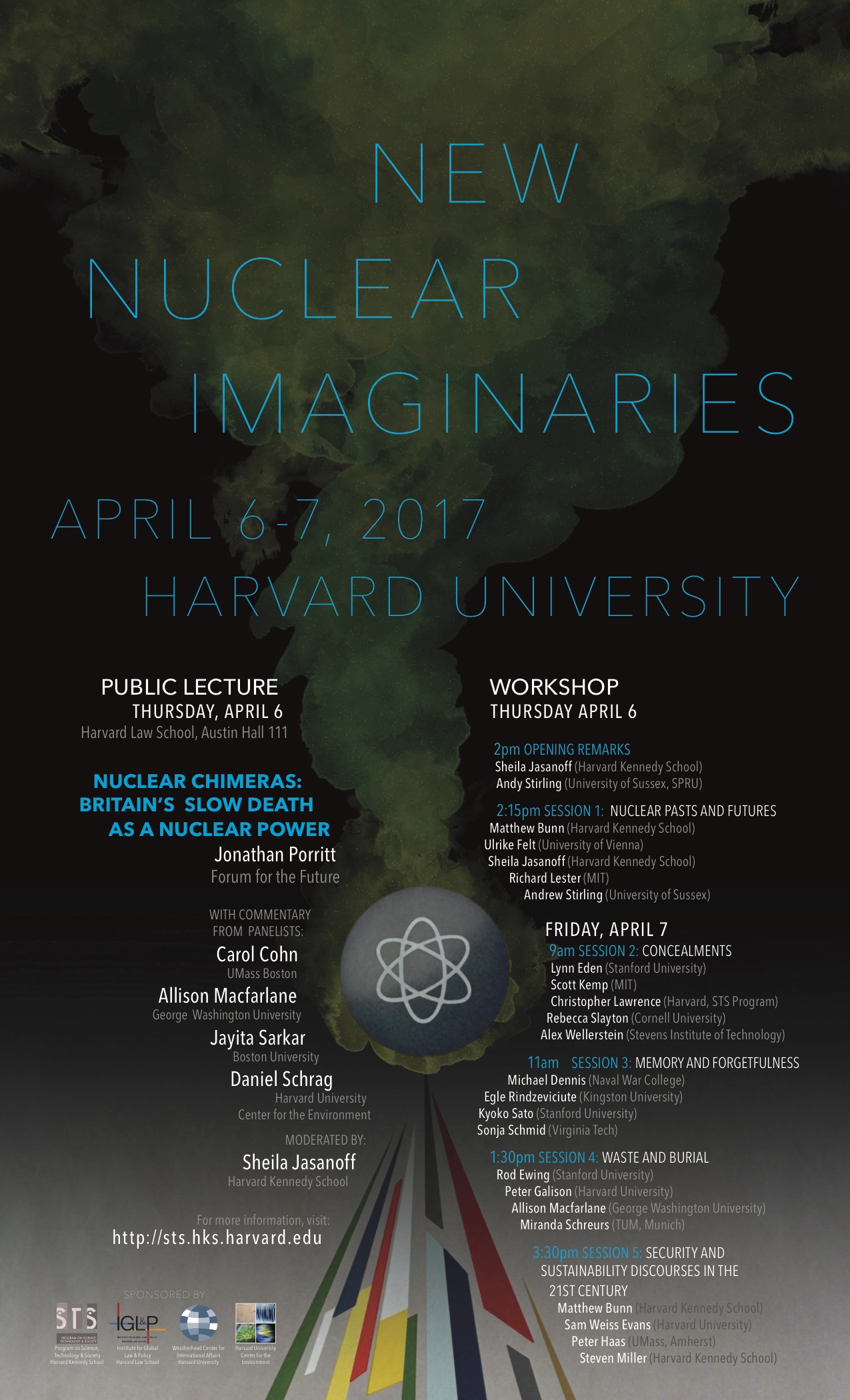Program on Science, Technology and Society at HarvardHarvard Kennedy School of Government | Harvard University |
|||||||
|
|
New Nuclear ImaginariesApril 6-7, 2017, 2:00PM AbstractNuclear worlds today are at a crossroads. As infrastructures age, stockpiles and wastes accumulate, and technologies, materials and interpretations proliferate, we face questions about how to build a just and responsible future out of the ambiguous legacies we have inherited. The future presents challenges of imagination as much as of technology and policy. Speaker biographies located here. Video available here. Public Lecture – Thursday, APRIL 6, 2017No registration required. Open to the public. 5:00 Public Lecture: “Nuclear Chimeras: Britain’s Slow Death as a Nuclear Power”- Harvard Law School. Austin Hall 111 – Video available here. Keynote Speaker: Jonathon Porritt (Forum for the Future), Porritt is a British environmentalist and writer, author most recently of The World We Made (Phaidon 2015). He has been a longstanding campaigner against nuclear power. With Commentary from panelists: Carol Cohn (University of Massachusetts, Boston) Allison Macfarlane (George Washington University) Jayita Sarkar (MIT) Daniel Schrag (Harvard University Center for the Environment) WorkshOpThursday, April 6th 2:00 Opening Remarks– Harvard University Center for the Environment, Room 440 Sheila Jasanoff (Harvard Kennedy School) Andy Stirling (University of Sussex, SPRU) 2:15 Session 1: Nuclear Pasts and Futures – – Harvard University Center for the Environment, Room 440 What are the emerging metaphors, images, framings, and discourses of contemporary nuclear thinking. Which do we believe will be more and less helpful in building a future world we’d like to see? Speakers: Matthew Bunn (Harvard Kennedy School) Ulrike Felt (University of Vienna) Sheila Jasanoff (Harvard Kennedy School) Richard Lester (MIT) Andrew Stirling (University of Sussex) 4:00 Break Friday, April 7 – Harvard University Center for the Environment, Room 440 The morning sessions will bring out how previous articulations of nuclear threats and their management have made some things (technical aspects, power relations, infrastructures, etc.) visible and hidden or contained others. Speakers will discuss how decisions about visibility and invisibility—whether explicit or unconscious—may have unintended consequences. 9:00 Session 2: Concealments Lynn Eden (Stanford University) Scott Kemp (MIT) Christopher Lawrence (Harvard, STS Program) Rebecca Slayton (Cornell University) Alex Wellerstein (Stevens Institute of Technology) 10:30 Coffee 11:00 Session 3: Memory and Forgetfulness Michael Dennis (Naval War College) Kyoko Sato (Stanford University, STS) Egle Rindzeviciute (Kingston University, London) Sonja Schmid (Virginia Tech) 12:30 Lunch The afternoon sessions will allow speakers to discuss what they see as the major challenges regarding nuclear energy and nuclear weapons in the 21st century. Our hope is that some of the STS themes arising during the absence/visibility section will be carried over into this more concrete discussion of nuclear issues. 1:30 Session 4: Waste and Burial Rod Ewing (Stanford University) Peter Galison (Harvard University) Allison Macfarlane (George Washington University) Miranda Schreurs (TUM, Munich) 3:00 Coffee 3:30 Session 5: Security and Sustainability Discourses in the 21st Century Matthew Bunn (Harvard Kennedy School) Sam Weiss Evans (Harvard University) Peter Haas (University of Massachusetts, Amherst) Steven Miller (Harvard Kennedy School) Co-sponsored by the Harvard University Center for the Environment, Institute for Global Law and Policy at Harvard Law School, and the Weatherhead Center for International Affairs |
||||||
